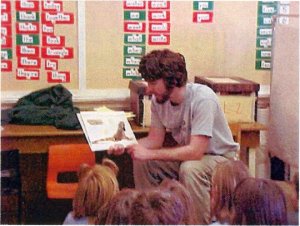
The intent of these selections was to offer a range of genres that would engage children during the Read Aloud sessions. The collection of poetry by Shel Silverstein was not considered by any of the mentors as a possibility for reading aloud even when it was recommended by the project researchers. Click Clack Moo, Cows that Type by Doreen Cronin was at first, rejected by several mentors based on the larger print font. One mentor commented that the font size meant that the story would be 'babyish.' In actual fact, this book is about two groups of farm animals that enter contract negotiations with the farmer. When their negotiations break down, they serve the farmer with written strike notice. Duck is considered a neutral party and acts as a mediator for the parties. Once the mentors were made aware of the vocabulary and theme of this book, several teams selected the book to read to their classes. Vocabulary such as 'neutral' and 'ultimatum' and the theme of contract negotiating made this an appropriate read aloud selection for upper elementary students.

The Read Aloud selections chosen revealed
that narrative/ fiction was the most popular genre
selected by the mentors for the Read Aloud sessions.
Joanna Good in her article in the Calgary Herald
(Nov. 26, 2003) supports this notion of narrative
being a choice amongst boy readers. Jerome Bruner
(1984, 1986) writes eloquently about the importance
of narrative as a way to access one's own story as
one struggles to make sense of the world. It is part
of the way a child learns about him or herself.
Knowing one's own story, then knowing others'
helps an individual come to an understanding of
many perspectives.
Immersion in the narrative structure provides a map for young learners seeking an identity, notwithstanding, the current view that boys also favor sound bites and technological text (Jobe & Dayton Sakari, 2002). The mentors in the research project did have the opportunity to choose information books - we had purchased these for the classroom and the read aloud collection. The mentors chose books based on their own interests and the type of subject requested by the children. Mentors reported that books about animals (snakes, bears, etc.) were often requested.